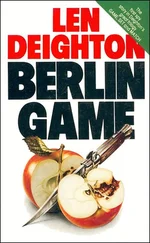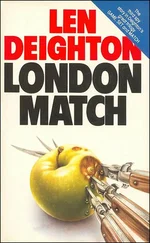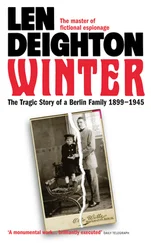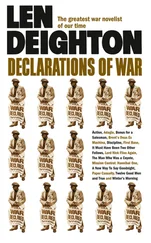‘Don’t play games with me, Superintendent,’ said Kellerman without changing the affable tone of voice or the smile. ‘You know what I’m talking about.’
‘I’m not sure I do, sir.’
‘Neither of us wants political advisers in this building, Superintendent. Inevitably the outcome would be that your police force is used against British Resistance groups, uncaptured soldiers, political fugitives, Jews, gypsies and other undesirable elements.’ Kellerman said it in a way that conveyed the idea that he didn’t consider these elements nearly so undesirable as his superiors in Berlin thought them.
‘It would split the police service right down the middle,’ said Douglas.
Kellerman didn’t answer. He reached for a teleprinter message on his desk and read it, as if to remind himself of the contents. ‘A senior officer of the Sicherheitsdienst is on his way here now,’ said Kellerman. ‘I’m assigning you to work with him.’
‘His duties will be political?’ asked Douglas. The SD was the SS intelligence service. Douglas did not welcome this sinister development.
‘I don’t know why he’s coming,’ said Kellerman cheerfully. ‘He is on the personal staff of the Reichsführer-SS and will remain directly responsible to Berlin for whatever he has to do.’ Kellerman inhaled on his cigar and then let the smoke drift from his nostrils. He let his Superintendent dwell upon the facts and realize that the new man presented a danger to the status quo for both of them. ‘Standartenführer Huth,’ said Kellerman finally, ‘that’s this new chap’s name.’ His use of the SS rank was enough to emphasize that Huth was an outsider. Kellerman raised his hand. ‘Under the direct orders of Berlin, so that gives him a special…’ he hesitated and then let the hand fall, ‘…influence.’
‘I understand, sir,’ said Douglas.
‘Then perhaps, my dear chap, you’d do everything you can to prevent the indiscretions – more particularly the verbal indiscretions – of your mentor downstairs from embarrassing us all.’
‘Detective Sergeant Woods?’
‘Ah, what a quick mind you have, Superintendent,’ said Kellerman.
Some said there had not been even one clear week of sunshine since the cease-fire. It was easy to believe. Today the air was damp, and the colourless sun only just visible through the grey clouds, like an empty plate on a dirty tablecloth.
And yet even a born and bred Londoner, such as Douglas Archer, could walk down Curzon Street, and with eyes half-closed, see little or no change from the previous year. The Soldatenkino sign outside the Curzon cinema was small and discreet, and only if you tried to enter the Mirabelle restaurant did a top-hatted doorman whisper that it was now used exclusively by Staff Officers from Air Fleet 8 Headquarters, across the road in the old Ministry of Education offices. And if your eyes remained half-closed you missed the signs that said ‘Jewish Undertaking’ and effectively kept all but the boldest customers out. And in September of that year 1941, Douglas Archer, in common with most of his compatriots, was keeping his eyes half-closed.
The scene of the murder to which, as Detective Sergeant Harry Woods had predicted, they were called, was Shepherd Market. This little maze of narrow streets and alleys housed a mixture of working-class Londoners, Italian shopkeepers and wealthy visitors, who found in these tortuous ways, and creaking old buildings, some measure of the London they’d read of in Dickens, while being conveniently close to the smart shops and restaurants.
The house was typical of the neighbourhood. There were uniformed police there already, arguing with two reporters. The ground floor was a poky antique shop not much wider than a man could stretch both arms. Above it were rooms of doll’s-house dimensions, with a twisting staircase so narrow that it provided an ever-present risk of sweeping from its walls the framed coaching prints that decorated them. Only with difficulty did Harry get the heavy murder bag to the top floor where the body was.
The police doctor was there, seated on a chintz-covered couch, a British army overcoat buttoned up tight to the neck, and hands in his pockets. He was a young man, in his middle twenties, but already Douglas saw in his eyes that terrible resignation with which so many British seemed to have met final defeat.
On the floor in front of him there was the dead man. He was about thirty-five years old, a pale-faced man with a balding head. Passing him in the street one might have guessed him to be a rather successful academic – the sort of absent-minded professor portrayed in comedy films.
As well as blood, there was a large smudge of brown powder spilled on his waistcoat. Douglas touched it with a fingertip but even before he raised it to his nose, he recognized the heavy aroma of snuff. There were traces of it under the dead man’s fingernails. Snuff was growing more popular as the price of cigarettes went up, and it was still unrationed.
Douglas found the snuff tin in a waistcoat pocket. The force of the bullets had knocked the lid off. There was a half-smoked cigar there too, the band still on it, a Romeo y Julieta worth a small fortune nowadays; no wonder he’d preserved the unsmoked half of it.
Douglas looked at the fine quality cloth and hand stitching of the dead man’s suit. For such expensive, made to measure garments they fitted very loosely, as if the man, suddenly committed to a rigorous diet, had lost many pounds of weight. Sudden weight loss was also suggested by the drawn and wrinkled face. Douglas fingered the bald patches on the man’s head.
‘Alopecia areata,’ said the doctor. ‘It’s common enough.’
Douglas looked into the mouth. The dead man had had enough money to pay for good dental care. Gold shone in his mouth but there was blood there too.
‘There’s blood in his mouth.’
‘Probably hit his face as he fell.’
Douglas didn’t think so but he didn’t argue. He noted the tiny ulcers on the man’s face and blood spots under the skin. He pushed back the shirt sleeve far enough to see the red inflamed arm.
‘Where do you find such sunshine at this time of the year?’ the doctor said.
Douglas didn’t answer. He drew a small sketch of the way that the body had fallen backwards into the tiny bedroom, and guessed that he’d been in the doorway when the bullets hit him. He touched the blood on the body to see if it was tacky, and then placed a palm on the chest. He could feel no warmth at all. His experience told him that this man had been dead for six hours or more. The doctor watched Douglas but made no comment. Douglas got to his feet and looked round the room. It was a tiny place, over-decorated with fancy wallpapers, Picasso reproductions and table lights made from Chianti bottles.
There was a walnut escritoire, with its front open as if it might have been rifled. An old-fashioned brass lamp had been adjusted to bring the light close upon the green leather writing top but its bulb had been taken out and left in one of the pigeon-holes, together with some cheap writing paper and envelopes.
There were no books, no photos and nothing personal of any kind. It was like some very superior sort of hotel room. In the tiny open fireplace there was a basket of logs. The grate was overflowing with ashes of paper.
‘Pathologist here yet?’ Douglas asked. He fitted the light bulb into the brass lamp. Then he switched it on for long enough to see that the bulb was still in working order and switched it off again. He went to the fireplace and put his hand into the ash. It was not warm but there was no surviving scrap of paper to reveal what had been burned there. It was a long job to burn so much paper. Douglas used his handkerchief to wipe his hands.
Читать дальше












